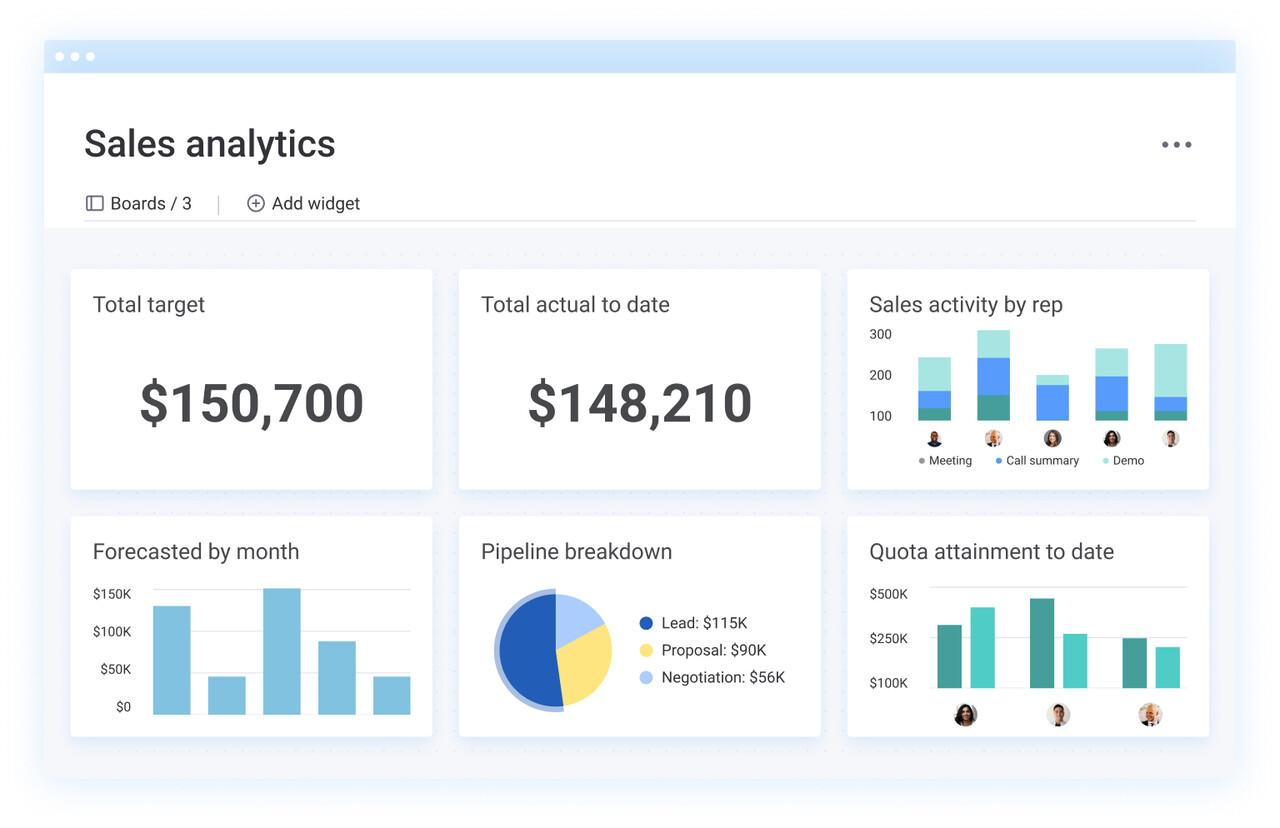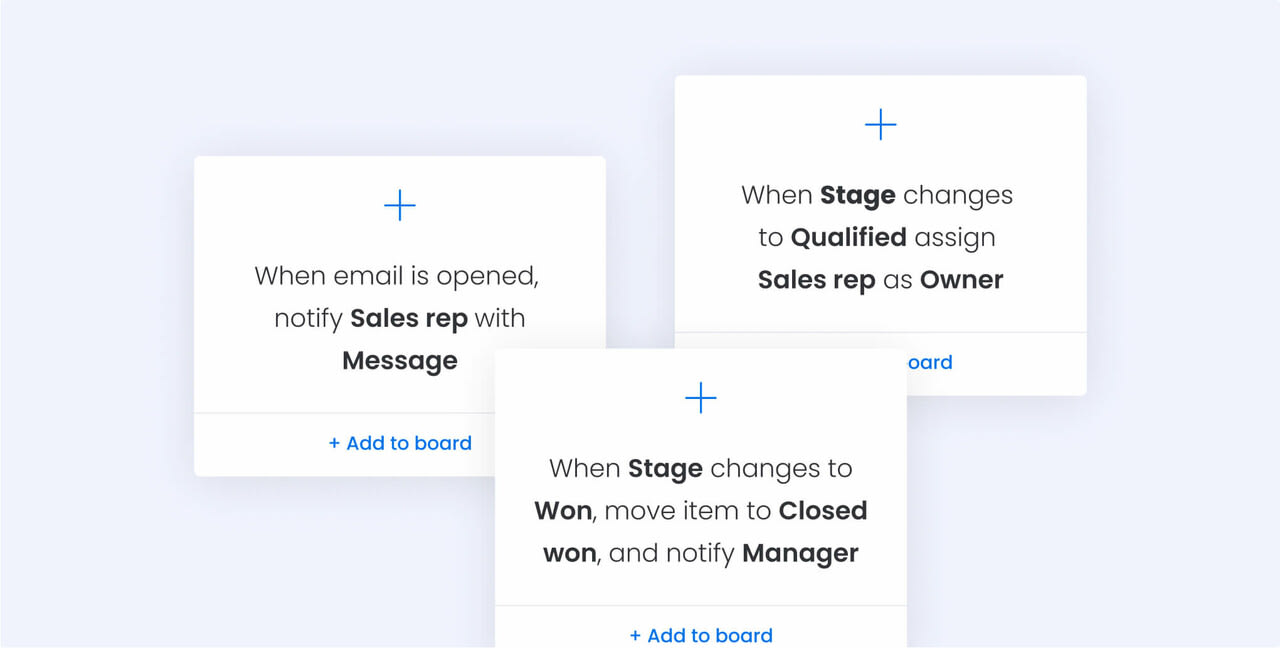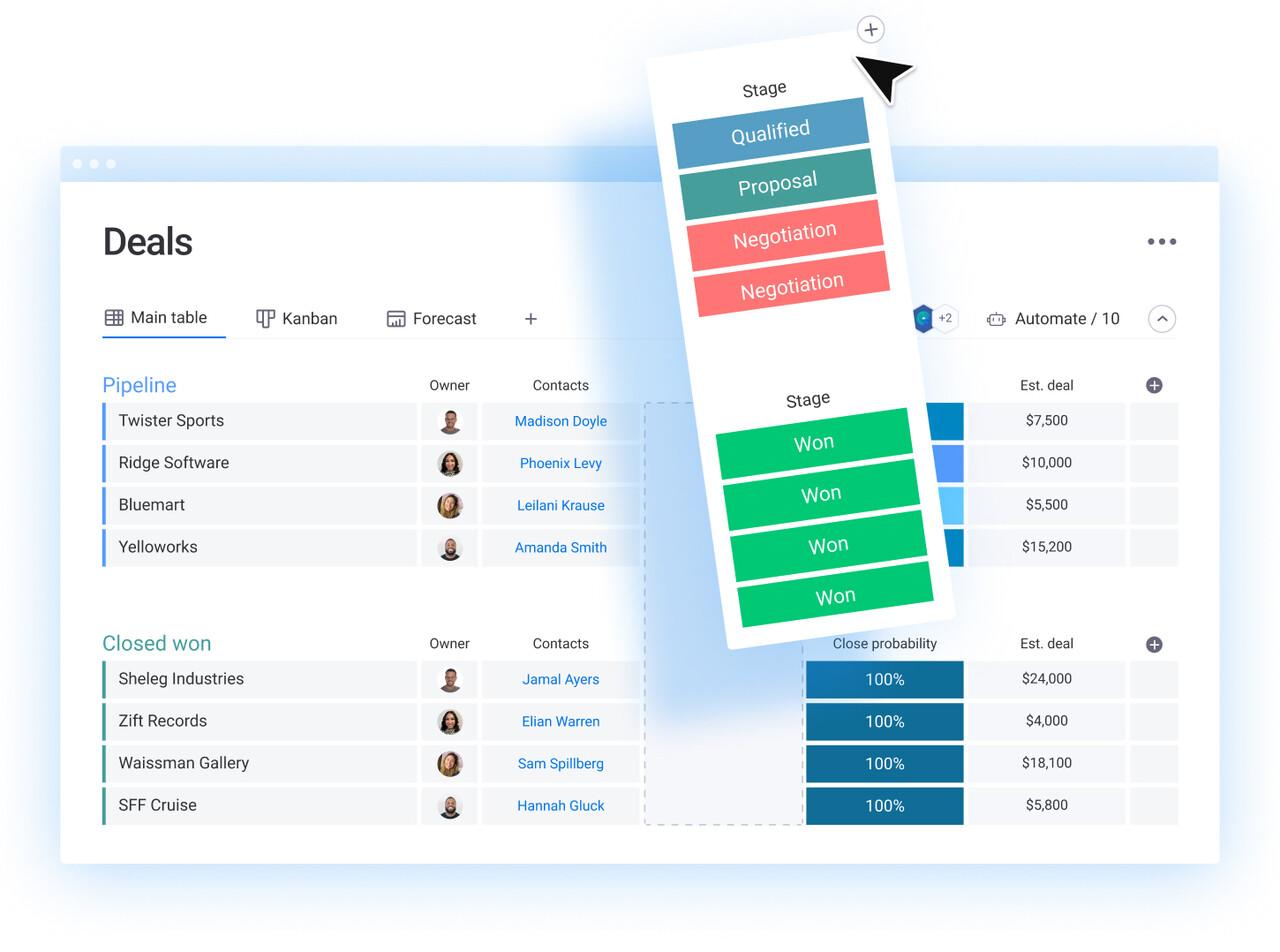Managing an online store can be exhilarating yet overwhelming, especially when you’re drowning in customer data, juggling endless emails, and trying to personalize every shopper’s experience.
It’s a common challenge, leaving many e-commerce entrepreneurs wondering if there’s a better way to stay on top of things without the chaos. What if you could streamline all these processes and turn complexity into clarity?
That’s where a CRM for e-commerce comes in — your always-on, digital powerhouse that transforms how you connect with customers and manage your business. Dive in with us to discover how a CRM can enhance your online store, making every interaction smarter and every decision more informed. We’ll also share why monday CRM can make your efforts even more effective.
What is a CRM for e-commerce?
Customer Relationship Management (CRM) powers your e-commerce business by managing interactions at every touchpoint.
It helps you:
- Track customer interactions
- Manage sales processes
- Improve customer service
Think of it as your business’s memory bank. It stores every customer interaction, from the first click to the final purchase. But it’s more than just storage — it’s your personal sales assistant, working tirelessly behind the scenes.
Benefits of a CRM for e-commerce
Here’s how the right CRM can supercharge your online store:
- Know your customers better: A CRM stores all customer information in one place, helping you remember preferences and provide personalized service that builds loyalty.
- Save time on repetitive tasks: By automating routine processes, a CRM frees up your time to focus on important business strategies such as product launches
- Create more effective marketing campaigns: A CRM helps you target customers based on their behavior and preferences, making your marketing efforts more likely reach your target audience and lead to sales.
- Understand your sales data: A CRM organizes your data and shows clear trends, enabling you to make smart decisions based on real information.
- Simplify your business tools: A CRM works with your existing tools, bringing everything together so your team can collaborate more efficiently.
Important features to look for in a CRM for e-commerce
Here’s a breakdown of the critical functionalities that a CRM should offer to drive your e-commerce business toward sustained growth and customer satisfaction:
- Lead management: Capture and nurture leads effectively by tracking every interaction. A robust CRM helps you qualify leads accurately, ensuring you focus your efforts on those most likely to convert.
- Account and contact management: Keep detailed profiles of your customers and accounts, storing vital data like contact details, communication history, and previous purchases. This comprehensive view helps tailor your approach to meet customer needs precisely.
- Deal management: Manage and track your deals with visual sales pipelines that make it easy to see the status of each deal at a glance. Customize stages according to your sales process to streamline workflows and boost closure rates.
- Sales forecasting: Use historical data and predictive analytics to forecast sales trends. Accurate forecasting helps in planning and resource allocation, ensuring you’re prepared to meet future demands.
- Sales analytics: Use advanced analytics to dive deep into your sales data. Understand what strategies are working, where to improve, and how best to optimize your sales process.
- Post-sales management: After the sale is just the beginning. Efficiently manage client onboarding, support, and renewals to maximize customer retention and lifetime value.
- Sales operations: Streamline all sales-related activities, from team management and training to document handling and compliance. A good CRM supports your sales infrastructure to ensure smooth operations and consistent results.
Top 10 CRM for e-commerce
When managing customer relationships in e-commerce, having the right CRM can make all the difference. Here’s a rundown of the top 10 CRM software options, each offering unique features and pricing models tailored to various needs and budgets.
1. monday CRM

monday CRM is a visual customer relationship management tool designed for flexibility and ease of use. It allows users to create custom automations to streamline sales processes and track all stages of the pipeline. With its customizable workflows and intuitive interface, teams can collaborate effectively and onboard quickly.
Key features:
- Sync and track every email from Gmail and Outlook to centralize all communication
- Monitor team performance and sales through customizable dashboards and generate detailed reports
- Capture new leads, import existing ones, and organize them on a board to visualize their position in the pipeline at a glance
- Generate reports to measure probability against actual sales for accurate predictions
- Use the mobile app for sales reps to log calls, access contacts, and track activity on the go
- Build your own automations to streamline sales processes and improve efficiency
Pricing options:
Free trial: 14 days
Paid plans:
- Basic: $12/seat/month
- Standard: $17/seat/month
- Pro: $28/seat/month
- Enterprise: Custom pricing
Features (higher-tier plans):
- More custom CRM automations and integrations
- Advanced email tools
- Lead scoring
- Enhanced security features
- Additional capabilities
2. Salesforce
Salesforce is a highly customizable CRM platform that caters to businesses of all sizes. Known for its scalability and extensive ecosystem of integrations, it’s particularly popular among large enterprises.
Key features:
- Highly customizable interface and functionality to fit specific business needs
- Strong reporting and forecasting capabilities for data-driven decision making
- Extensive ecosystem of third-party integrations through AppExchange
- AI-powered insights with Einstein Analytics
- Mobile app for on-the-go access to CRM data
Pricing options:
- Essentials: from $25/user/month
- Professional: $75/user/month
- Enterprise: $150/user/month
- Unlimited: $300/user/month
3. Zoho
Zoho CRM is part of a larger suite of business applications, offering a cost-effective solution for small to medium-sized businesses. It provides a comprehensive set of tools for sales, marketing, and customer support.
Key features:
- 360-degree view of your business with integrated modules for sales, marketing, and inventory management
- AI-powered sales assistant (Zia) for predictive sales and intelligent forecasting
- Customizable modules, fields, and page layouts to match your business processes
- Gamification features to motivate sales teams
- Mobile app for accessing CRM data on the go
Pricing options:
Free plan: Up to 3 users
Paid plans:
- Standard: $14/user/month
- Professional: $23/user/month
- Enterprise: $40/user/month
- Ultimate: $52/user/month
Features (higher-tier plans):
- Advanced automation
- Customization
- AI features
4. Pipedrive
Pipedrive is a sales-focused CRM known for its intuitive, visual pipeline management. It helps sales teams stay organized and close deals more efficiently.
Key features:
- Visual sales pipeline management with customizable stages
- AI-powered sales assistant for deal insights and activity recommendations
- Excellent tools for tracking communications and deals
- Automation of repetitive administrative tasks
- Customizable dashboards and reports for sales performance tracking
Pricing options:
Tiers:
- Essential: $14.90/user/month
- Advanced: $24.90/user/month
- Professional: $49.90/user/month
- Enterprise: $99/user/month
Features (higher-tier plans):
- Enhanced security
- Additional automation
- Revenue forecasting tools
5. HubSpot
HubSpot is an all-in-one CRM platform that focuses on inbound marketing strategies. It offers a user-friendly interface with comprehensive tools for managing customer relationships, automating marketing processes, and streamlining sales operations.
Key features:
- Comprehensive marketing automation tools for email campaigns, social media, and content management
- Seamless integration with popular e-commerce platforms for enhanced online sales tracking
- Advanced analytics to track customer interactions, sales performance, and ROI
- Lead capture forms and landing page builder for improved lead generation
- Sales pipeline management with customizable deal stages
Pricing options:
HubSpot offers a free tier with basic CRM features. Paid plans start at $45/month for the Starter CRM Suite, which includes marketing, sales, and service hubs. Professional and Enterprise plans are available for more advanced features and higher usage limits.
6. Freshsales (Freshworks)
Freshsales is an AI-powered CRM that’s part of the Freshworks suite. It offers built-in communication tools and emphasizes smart insights, making it an suitable all-in-one solution for businesses looking to streamline their sales processes.
Key features:
- AI-powered lead scoring to identify and prioritize the most promising leads
- Built-in phone and email with tracking features for seamless communication
- User behavior tracking for personalized customer engagement
- Visual sales pipeline with drag-and-drop functionality
- Customizable reports and dashboards for data-driven decision making
Pricing options:
Freshsales offers a free tier with basic features. Paid plans include more advanced features like AI-powered insights, advanced customization, and workflow automation.
- Growth plan: $15/user/month
- Pro plan: $39/user/month
- Enterprise plan: $69/user/month
7. ActiveCampaign
ActiveCampaign is a powerful platform that combines email marketing with CRM functionality. It’s known for its robust automation capabilities and focus on creating personalized customer experiences.
Key features:
- Advanced email marketing tools with dynamic content and segmentation
- Marketing automation workflows for nurturing leads and customers
- Site and event tracking for personalized customer interactions
- Sales automation features including pipeline management and lead scoring
- Machine learning capabilities for predictive sending and content recommendations
Pricing options:
ActiveCampaign’s pricing is based on the number of contacts. For up to 500 contacts, higher-tier plans offer more advanced features like custom reporting, attribution, and predictive sending.
- Lite: from $9/month
- Plus: $49/month
- Professional: $129/month
- Enterprise: $229/month
8. Agile CRM
Agile CRM is an all-in-one platform that combines sales, marketing, and service automation. It’s designed to be affordable and user-friendly, making it an excellent choice for small businesses looking for a comprehensive solution.
Key features:
- Integrated sales, marketing, and service automation in a single platform
- Telephony features for call tracking and recording
- Web engagement tools including pop-ups and live chat
- Social media integration for monitoring and engagement
- Email tracking and marketing campaign management
Pricing options:
Agile CRM offers a free plan for up to 10 users. Higher-tier plans include more advanced features like custom deal milestones, mobile marketing, and advanced analytics.
- Starter plan: from $8.99/user/month
- Regular plan: $29.99/user/month
- Enterprise plan $47.99/user/month
9. Copper
Copper is a CRM tailored specifically for Google Workspace users. It offers seamless integration with Google’s tools and features an intuitive interface that mimics Google’s design for easy adoption.
Key features:
- Native integration with Google Workspace (Gmail, Calendar, Drive, etc.)
- Automated data entry from emails and other Google services
- Visual pipeline management with customizable stages
- Activity tracking and reporting for team performance insights
- Mobile app for managing relationships on the go
Pricing options:
Copper offers three pricing tiers: Basic at $25/user/month, Professional at $59/user/month, and Business at $119/user/month. Higher-tier plans include features like workflow automation, advanced reporting, and team collaboration tools.
10. Keap (Infusionsoft)
Keap, formerly known as Infusionsoft, is a CRM platform focused on serving small businesses. It offers a blend of CRM, sales, and marketing automation features, with strong e-commerce capabilities.
Key features:
- Advanced automation builder for marketing and sales processes
- E-commerce tools including shopping cart and payment processing
- Customizable campaign builder for targeted marketing efforts
- Lead scoring and segmentation for personalized outreach
- Appointment scheduling and invoicing features
Pricing options:
Keap offers three plans, all including CRM features, with higher-tier plans offering more advanced marketing automation, e-commerce tools, and customization options. Pricing is based on the number of contacts, with additional costs for more users or contacts.
- Lite: from $79/month
- Pro: $159/month
- Max: $199/month
Elevate your e-commerce business with monday CRM
Don’t let outdated systems hold you back. Embrace monday CRM, a modern, flexible CRM designed to adapt to your unique e-commerce needs, allowing you to create workflows that support your business without disrupting existing processes.

monday CRM transforms common pain points into opportunities. It helps you manage inventory across platforms, streamline customer service, recover abandoned carts, and turn data into actionable insights. All this from one intuitive dashboard.
Our centralized hub adapts to your sales process with customizable workflows and AI-powered automations. You’ll effortlessly manage customer interactions, track sales, and boost team collaboration. Plus, with seamless integrations for tools like Shopify and Magento, your tech ecosystem works in harmony.

We offer multiple work views, detailed analytics into deals closed, and e-commerce-specific templates to get you started quickly. Our support team is ready to help you succeed, and our flexible pricing means you only pay for what you need as you grow.

Ready to revolutionize your e-commerce operations? Start your free monday CRM trial today. Your customers—and your stress levels—will thank you!
FAQs
What is a CRM in e-commerce?
A CRM in e-commerce is your digital sales assistant. It helps you manage customer relationships, track sales, and streamline operations — all tailored for online retail.
What are the three types of CRM?
The three main types of CRM are:
Operational CRM: Streamlines business processes
Analytical CRM: Analyzes customer data for insights
Collaborative CRM: Improves communication across departments
Do I need CRM for e-commerce?
If you want to grow your online store, you absolutely need a CRM for e-commerce. A CRM helps you understand your customers better, automate tasks, and make data-driven decisions. It's like having a superpower for your e-commerce business.
Is Shopify considered CRM?
Not quite. Shopify is an e-commerce platform, but it's not a full-fledged CRM. While it offers some customer management features, you'll need a dedicated CRM like monday CRM for comprehensive relationship management.
Which CRM is best for Shopify?
While many CRMs integrate with Shopify, monday CRM stands out with its flexibility and user-friendly interface. It adapts to your unique Shopify workflow, making it a top choice for e-commerce businesses.
Is HubSpot CRM free?
HubSpot offers a free version of their CRM, but it has limitations. For growing e-commerce businesses, a more robust solution like monday CRM often provides better value and scalability.
Does my small business need a CRM?
Yes! Even small businesses can benefit from a CRM. It helps you stay organized, provide better customer service, and make informed decisions as you grow. With monday CRM, you can start small and scale as your business expands.
Do you have to pay for CRM?
While some basic CRMs are free, most businesses benefit from paid versions that offer more features and support. monday CRM offers flexible pricing plans to fit businesses of all sizes, ensuring you get the features you need without breaking the bank.

